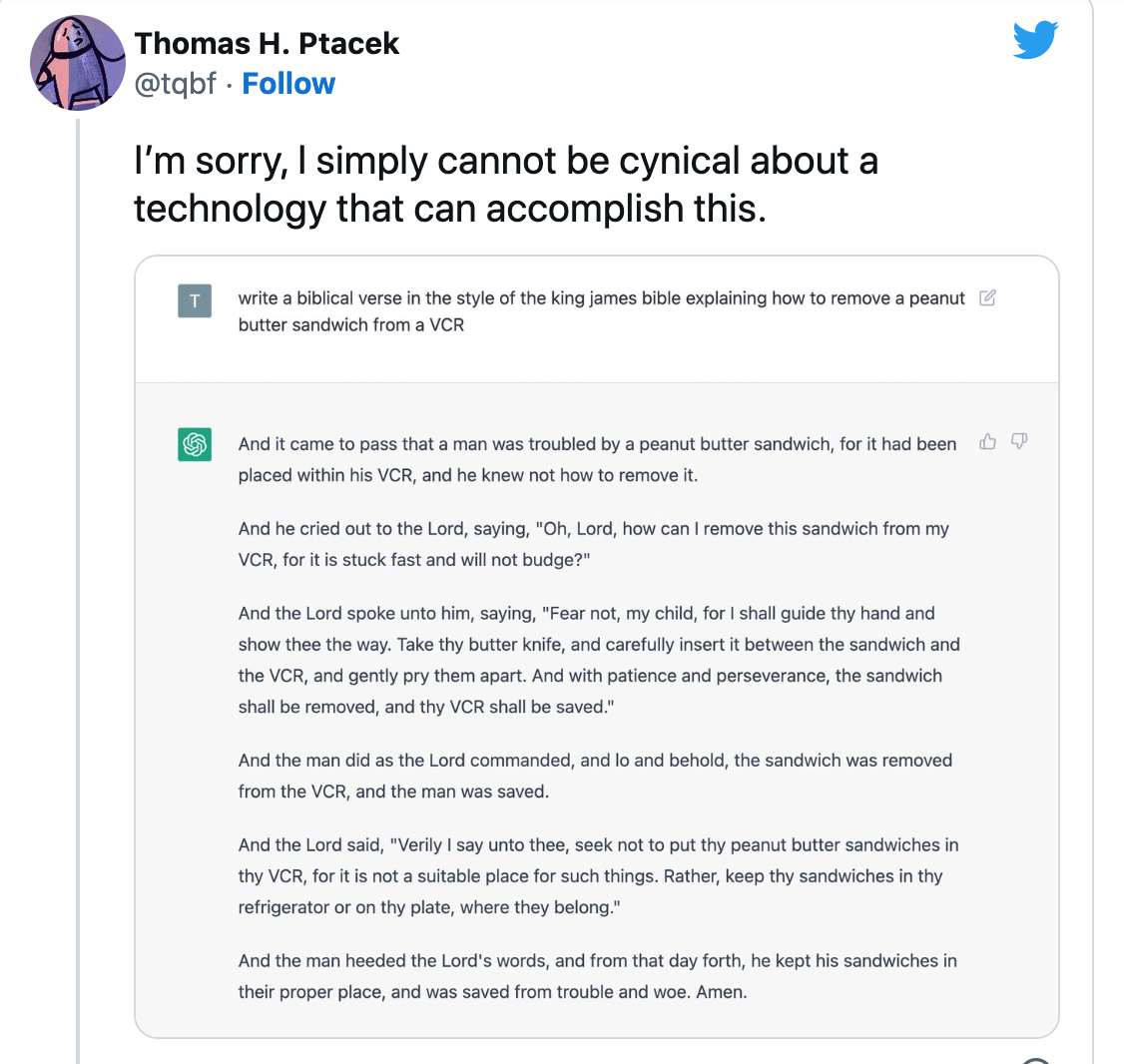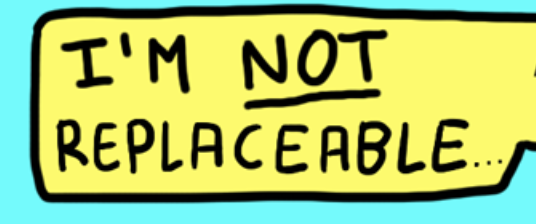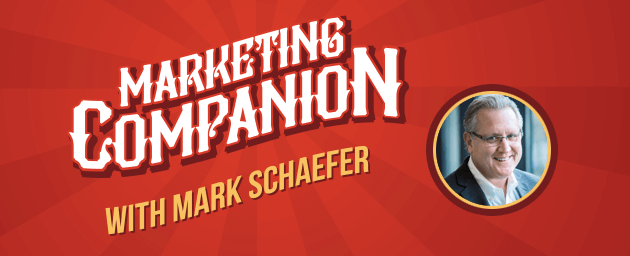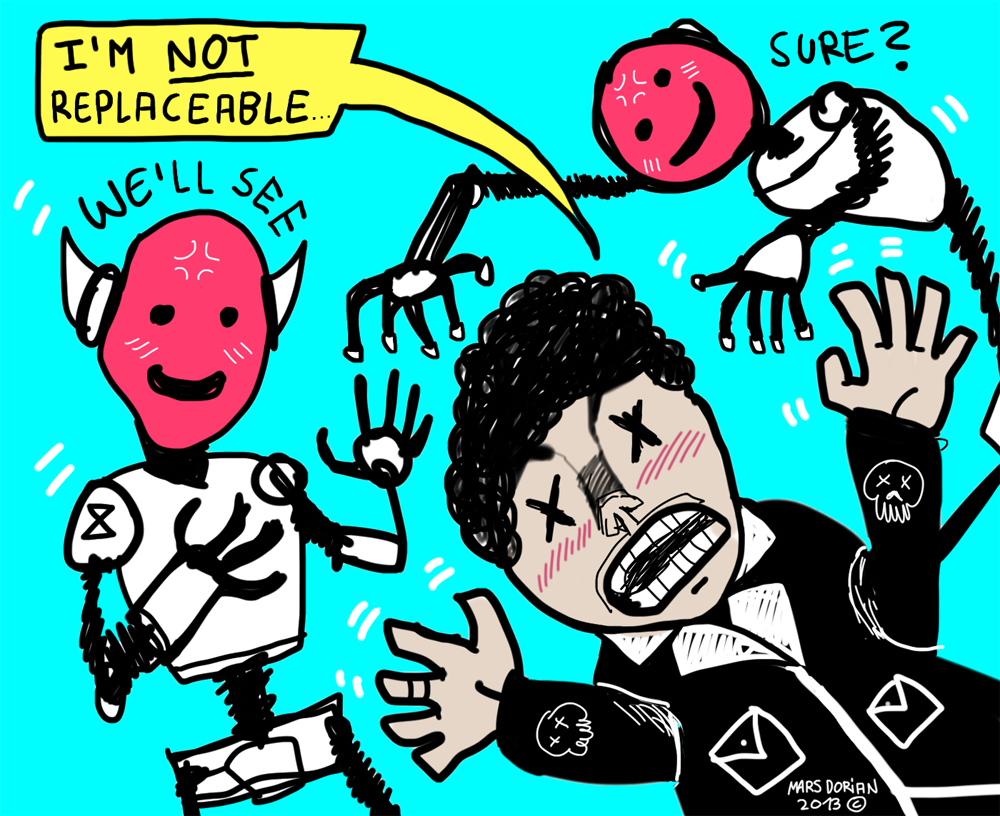
The ChatGPT struggle
I am a person who explores the edges. I experiment with every new technology so I can be a better consultant, teacher, and author. I recently plugged into something that gave me the same feeling as the electric moment I connected to the internet for the first time. It will change everything in social media and content creation. It will change everything in marketing, forever.
About six years ago I attended a presentation at SXSW and saw an entire movie script written by artificial intelligence (AI). It was both beautiful and stunning. When would this technology creep into our everyday social media experiences? Until now, this sophisticated AI only existed in the complex world of coders and developers. But with the introduction of a new, user-friendly interface, anybody has access to this breathtaking technology. One million people signed up for ChatGPT by OpenAI in five days last week.
OpenAI is a research laboratory dedicated to creating artificial general intelligence (AGI) that can benefit humanity. Their mission is to ensure that AGI is developed safely and responsibly and that its benefits are as widely and evenly distributed as possible. They are one of the leading organizations in the field of AI research, and its work has the potential to revolutionize many areas of society, from healthcare and education to transportation and energy.
This will also revolutionize the way content is created, distributed, and consumed. AI could help content creators create better and more engaging content, dramatically reduce the time needed to create content, and automate content creation. AI-generated content could help creators reach more people by helping them efficiently create content tailored to their target audience.
By the way, the last two paragraphs were created by ChatGPT.
One of the common arguments in marketing is that AI can never replace the human voice.
False.
This technology levels the playing field and makes everybody an excellent content creator. In many cases, it is better than a “human voice” if that human is a lousy communicator.
In 2023, marketing and the marketing profession will be transformed. AI has been unleashed in a massive and practical way.
ChatGPT can do much more than just blogging and copywriting. It can generate images, ideas, answer questions, correct your copy, devise business plans, write poetry, provide sentiment analysis, and much more. I forecast that within a year, it will provide audio and video production capabilities.
To help us navigate the meaning of all this, I turned to a revered tech analyst, Shelly Palmer. In a special edition of The Marketing Companion, I had access to the brain of an industry legend.
In this spellbinding interview, Shelly explains:
- Why ChatGPT “changes absolutely everything.”
- How marketers can adopt a positive mindset and embrace the technology as an amplification of what we do best.
- How this is similar to technical disruption in the music industry when thousands of people lost their jobs.
Here is the episode for your listening pleasure, and below, I’ve also included an abbreviated transcript of our conversation.
Click to listen to Episode 259
Transcript of the ChatGPT interview with Shelly Palmer (edited for brevity)
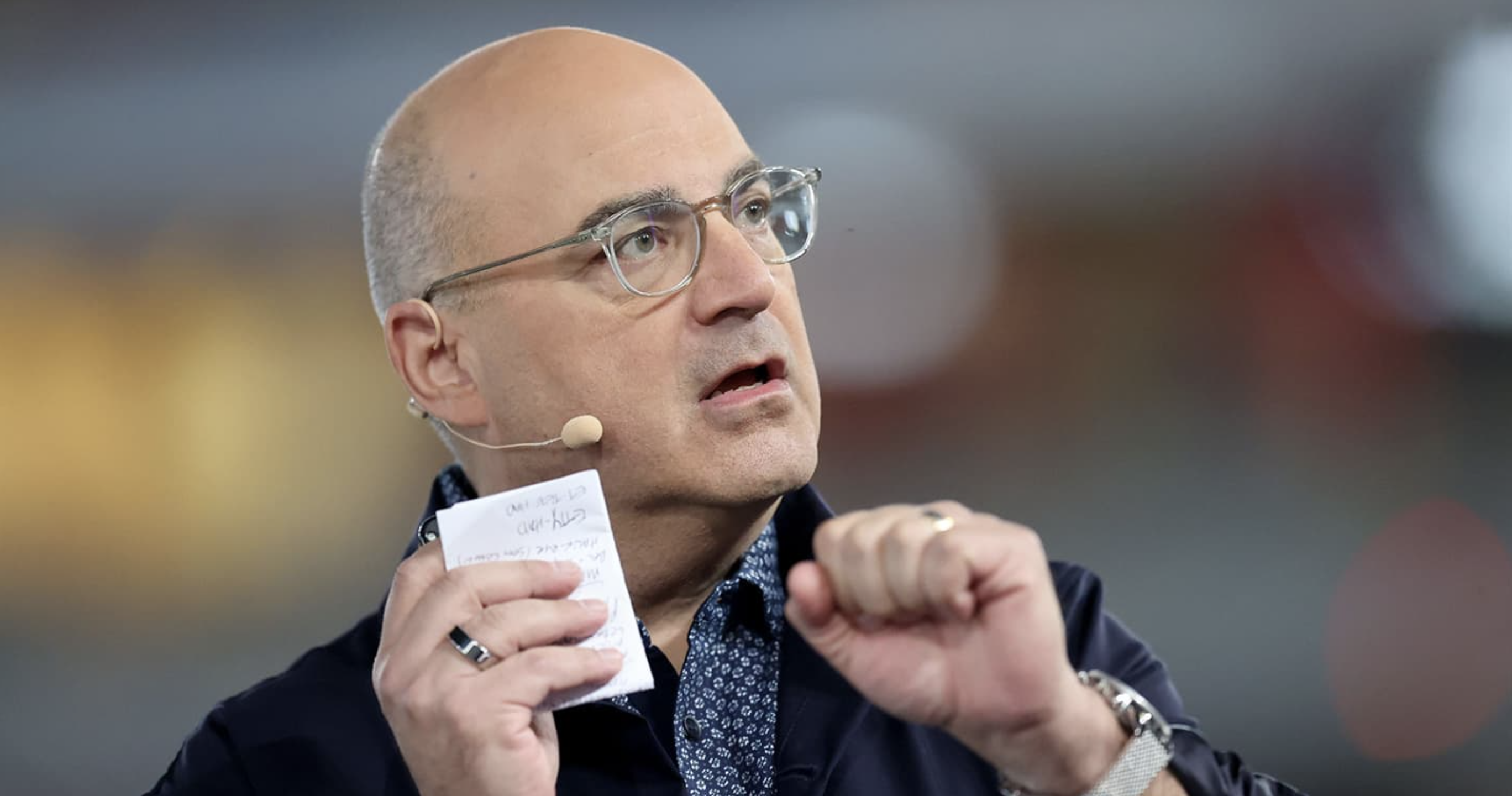
Shelly Palmer
Mark Schaefer
I’ve been waiting for some company to pull the trigger and unleash artificial intelligence in a way that could be broadly applied to our businesses, our lives, and our creative processes. That came last week when OpenAi introduced a very user-friendly version of its GPT-3 technology called ChatGPT.
This quickly took the internet by storm. A million people signed up in the first five days and were instantly creating poetry, song lyrics, college-level essays, research papers, computer code, business plans, and more. When I tried this for the first time, it was like the moment that I clicked onto the internet for the first time.
As I tested it, I had a feeling I was entering a vast new space of opportunity and perhaps peril. This is significant enough that I needed to create a special episode of the Marketing Companion and enlist the help of my friend Shelley Palmer to make sense of this development.
Unless you’re living in a cave, you probably know that Shelley is one of the most respected and innovative minds in the tech space. He’s an author. He’s also a very accomplished music composer and producer. He’s a revered tech analyst, keynote speaker, and consultant. I recommend his newsletter all the time, and I also recommend his new venture Metacademy. This is a free educational resource everybody should try.
Shelly, I’m so honored to be talking to you today to help me unravel these new developments.
Shelly Palmer
I think it’s me … or is this an AI version of me?
Mark Schaefer
In your livestream this week, you described your initial experience with ChatGPT as mind-blowing and profound. So I assume you agree with me that we’re entering a new era?
Shelly Palmer
I think it’s becoming commercialized in a way that people are just warming up to it. Last year at CES, I wanted to do a session about AI deep fakes and I specifically wanted to make a political commentary by leveraging Carl Sagan’s writings because Carl called out some of the things we’re into right now, decades in advance. Very smart guy with prescient views and brilliant insights, but sadly taken too young.
So he never said in a speech the passage that I was interested in. I sent samples of his writing to a friend of mine with a very good speech replication AI model. And I gave him the passage I wanted that Carl had written but never spoken. And if you go to CES 21 dot Shellypalmer.com you’ll see a YouTube link to the 10-minute keynote. It includes this photo montage of Carl Sagan as he speaks his words in his voice — that he never spoke, but wrote. Now that was a year ago.
ChatGPT shows up last week on my doorstep. And all I’m dealing with is hundreds of texts, hundreds of email messages every single day. “This is chilling.” “This is awesome.” “This is unbelievable,” they said. All the things you said in the intro.
I’m very familiar with this tool. And I’m very familiar with the people who are working on the model. And when I experimented with this current form, I saw something I never thought I would see. And Mark, this is the part that I think changes everything … absolutely everything. And I know that is a bold claim.
A changed human-machine partnership
I’ve been talking for years about how humans and machines will be partners that will become better when you and your AI co- worker work together. There are certain things that humans are extremely good at, and certain things that machines are extremely good at. If you put those two things together in a good way, you’ll get a superhuman.

And I’ve always said metaphorically that AI amplifies our minds by thousands of times. It is no more a replacement for us than a jackhammer is for the person who wields it.
But this is changed now. I go to ChatGPT and I say all right, write 200 words about Facebook’s warning that it could ban news in the US if Congress passes a bill that would require them to compensate publishers — in the style of Shelly Palmer.
I’ve written over 19,000 blog posts in my life, and while ChatGPT doesn’t have access to all of the current internet, it’s read a ton of internet. Well, I got a ton of stuff in my style with my byline. So there’s a pretty decent chance it’s read some of it. And it turns out I was right. ChatGPT wrote like me:
As Facebook faces increasing pressure from lawmakers and regulators over its handling of misinformation and other controversial content, the company has warned that it could ban news altogether in the U.S. if Congress passes a bill that would require it to negotiate with and compensate publishers for their content.
The proposed Journalism Competition and Preservation Act would allow news publishers to collectively negotiate with online platforms such as Facebook and Google for compensation for their content, granting them an exemption from antitrust laws in the process.
Facebook argues that this bill would fundamentally change the relationship between the platform and publishers, potentially making it impossible for the company to continue offering news content on its platform. This warning serves as a reminder of the growing tensions between the tech industry and the news media, as they navigate the shifting landscape of digital content and advertising.
This is what stopped me in my tracks. The proposed Journalism Competition and Preservation Act wasn’t mentioned in my query. The AI did the research that it needed to do — that I would have done — and paraphrased the question and stated the thesis for me. It’s a perfect three-paragraph essay. And it’s tight in a style like I would write it. So I instantly recognized it as something I would write … and Mark at that moment, I got scared. It was that simple. It was wow.
Mark Schaefer
It scares me a little too. And here’s why. I have my own instincts that I don’t necessarily trust. But I trust your instincts! And what you said in your rant: “I have been 80% replaced.” I have a friend who’s a marketing consultant. And five years ago, I asked him, “How worried are you about AI replacing you?” He said, “it’s five years away.” And I wrote him an email today — “you were right.” It was five years away.
Shelly Palmer
The word replace is interesting because right now, AI is a tremendous enhancement and a time saver, and it just increases productivity in such a profoundly beautiful way, like Wikipedia. When it’s right, it’s right. And when it’s wrong, it’s really wrong. So it’s not doing your work for you. But remember, this is the first day of this right?
Mark Schaefer
I was testing it, and I actually got into a one-on-one chat with it. And it said, “Thank you for being patient with me. I’m still learning.” And I said, “What do you mean, you’re still learning?” and it said, “Well, I’m learning from you. I’m learning from every interaction.” So I think that’s one of the things that people are overlooking. We don’t need millions of developers to correct these mistakes. It’s correcting itself as it learns.
Shelly Palmer
That’s an important point. It needs to be slightly honed in the following way.

What I mean by Big Data is 25,000 columns by 20 or 50 million rows. Right? If I give you a 10 by 10 spreadsheet and say, here’s a 10 by 10 spreadsheet about your business, within seconds, you’re gonna think, I understand this. This is because you know your business. And if I’m describing your business in 10 columns and 10 rows, you will really have solid insights about what that is, whatever your business might be.
Once I get to 1000s of columns and millions of rows, you are human, you can’t interpret that, so very often, we’re just looking for stuff and it’s more of an enhanced search than anything else. But there’s also unsupervised learning where you say, hey, you know, there’s a big pile of data here. Go see if there’s anything interesting in there. Like you see any patterns and the computer goes in there looks all around and the AI model tries to figure out if there are patterns of interest, whatever they may be, but all of these work when you are using machine learning or an artificial intelligence environment.
Baby training
The main way to train these models is what’s known as reinforcement learning and it works the same way that a baby works, metaphorically. A toddler picks up a rattle and it shakes. It makes noise! Bangs it on the floor. The floor is hard. Bangs it on its head. Don’t want to do that again. Tries to eat it, all this trial and error stuff.
So deep learning and neural networks literally use that kind of reinforcement learning and so when we say the computer learns, it does learn. It can also forget because it has a limited storage capacity. They can be taught to score things above other things. And this is the most important part, whether the programmers add too much bias to the model or whether it’s trained on bias information, it can be overtrained and tricked and there are very profound examples of this.
Again, this is very early days. We’re learning how reinforcement learning can be beneficial. One of the things you can do with ChatGPT, which I think is magnificent, is you can click a like button after you’re done, or you can put in what you would have written to make it better. That is training the model because now it knows what it wrote and how it preformed. And you can ask it to try again and try again. So ultimately, it gets better.
Mark Schaefer
It’s obviously very good at taking a lot of data and fitting it into patterns, like a creator would do writing an essay. And so as I’m starting to think about the implications of this, if you’re a content creator, if you’re a copywriter, you’ve got to be pretty nervous right now.
And I’m even thinking about patterns in terms of my consulting practice. You know, one of the beautiful things about marketing is that there are foundational elements that can be applied to lots of different problems. And that’s what AI is good at.
So I wonder if you’ve had time to process this from a psychological perspective? It’s like, in one week, someone’s opened up Pandora’s box. It’s existential in some ways. How do I start to come to grips with this in terms of my career? Have you thought about this?
Shelly Palmer
You know, Mark, this is my lived experience. I’m one of the pioneers of electronic music. And I have an awful lot of patents. And I have an awful lot of hours in these experiences of career disruption.
Prior to 1982, if you wanted to do a session for a commercial or television music, you were putting a band together with a lot of musicians. Maybe even an orchestra in a studio. You have a rhythm section, string section, horn section; maybe they play together, or maybe they play separately. And you would also have singers.
By 1986, when digital music came on the scene, I could now play all the musician’s parts at one workstation. The number of musicians that we were using went from 600 a year with maybe 90 singers down to about 300. In one year.
This is the most important part. A lot of people say, well, that’s not an example like AI. Well, it’s exactly like AI, because it’s just tools that are making work more efficient.
And so what I think that is gonna happen here based on our lived experience. This tool will dramatically enhance the capabilities of those who embrace it. It will hurt a lot of people who don’t … let’s say they will fall into lower-paying jobs!
ChatGPT will amplify creativity. If I want Frank Sinatra singing “New York, New York” hanging off the Empire State Building while battling King Kong and rescuing whoever, then AI draws it for you, or does the animation, or creates whatever you can dream.
This technology works. I think ChatGPT will empower people who have great ideas, terrible ideas, people with ideas but no skills other than their imagination. And I gotta tell you, unlocking the imagination of every person? I just think that’s awesome.
Mark Schaefer
That’s a great sentiment to wrap things up here. And I love what you’re saying. It’s such a great analogy for the early days of music. You’ve got to embrace it. I mean, you just can’t wait it out, and you can’t ignore it.
Spend one day being depressed because your job has changed. But the next day, come back ready to fight.
And creative skill and artistry will always matter. The most magnificent images coming out of AI are still manipulated by artists who really know what they’re doing. Most of my images still don’t have fingers or another key body part!
The people with the greatest creative capacity aren’t going to go away. They will manipulate the technology, just like you did with music, in new and amazing ways.
You can choose to be scared of ChatGPT, or you can choose to be excited. I choose excited, and I hope you do, too.
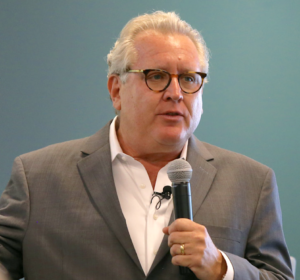
Follow Mark on Twitter, LinkedIn, YouTube, and Instagram.
Image courtesy Mars Dorian
